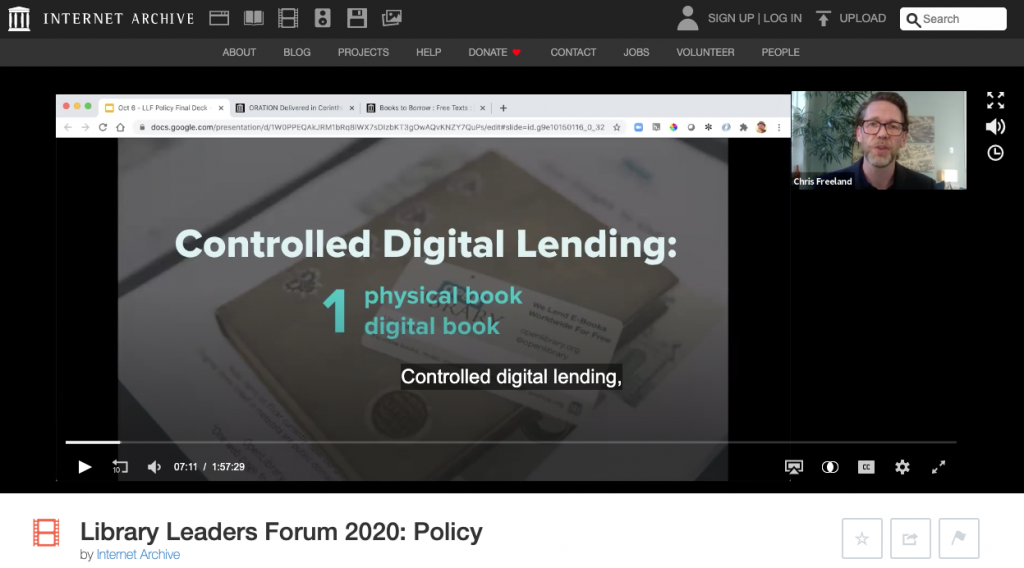COVID-19 has made it clear that digital access to books and other library materials is more important than ever. Yet, the information ecosystem is not working as well as it should.
These issues and more were explored during the Policy session of the Library Leaders Forum, a three-week series focused on empowering libraries and the communities they serve through digital lending. In addition to the panel discussion, special announcements were made about the donation and digitization of a rare Frederick Douglass pamphlet, and that Michelle Wu will receive the Internet Archive Hero Award at the final session of the Library Leaders Forum on October 20.

A captioned video of the entire session is now online and available for all to view.
Panel discussion
For the Policy session panel, librarians, authors, publishers, and advocates came together to discuss the role libraries should play in improving the digital landscape for the communities they serve. Potential policy solutions, such as copyright and labor law reforms, as well as collective action and boycotts to pressure publishers were discussed.
“Our country is struggling to find a common set of facts. The truth often lives behind paywalls while misinformation and disinformation go viral,” said Lila Bailey, policy counsel with the Internet Archive, moderating the discussion. “Equal access to information is foundational to our democratic society and it’s part of why libraries exist.”
Digital materials hold the promise for expanded access, but the outcome is not guaranteed. As publishers refuse to sell e-books, but rather license them, libraries are responding with a variety of strategies including Controlled Digital Lending – the digital equivalent of traditional lending.
As libraries evolve with the changing landscape, leaders need tools to change for the better. Brewster Kahle, founder of the Internet Archive, said the balance of power is up for grabs and publishers are pushing for control.
“We need librarians to be trained to push back,” Brewster said. “We are fighters for our patrons. We should stand by libraries and help empower them.”
Carmi Parker, librarian for the Whatcom County Library System in Washington state, said the average price of e-book licensing more than tripled over the past decade and libraries are forced to repurchase more frequently. When McMillan recently limited libraries to buying one e-book in the first eight weeks after publication (instead of dozens of copies of best sellers), Parker’s library consortium launched a boycott. After 1,200 other public libraries joined the protest, the publisher bowed to the pressure and dropped the practice.
“The concern here is this pattern of increasing prices and increasingly limited licenses that impede our ability to offer books to our patrons,” Parker says. “We think that we sent the message that embargoes are not OK, but we still have the crippling prices and limitations. We need to use print lending as a model for how these e-books should work. That’s why I’m interested in Controlled Digital Lending because that’s exactly what it does.”
Kyle K. Courtney, copyright advisor & program advisor at Harvard University, said CDL is a complementary model that helps libraries preserve their mission of long-term preservation and access.
“CDL has emerged as one of several answers to deal with these access issues now,” Courtney says. “CDL helps fill this digital void by harnessing the library’s special role in copyright to broaden digital access. We are craving this kind of digital access.”
Some panelists underscored it was important to embrace new forms of dissemination, but that CDL was an incomplete solution in need of refinement.
Many authors are coming around to the idea that sharing their works openly can only help them gain readers, said Dean Smith, director of Duke University Press.
“We are focused on smart and sustainable Open Access,” says Smith, who adds that OA usage has made his press more relevant. CDL is especially useful for titles that are out of print to bring scholarship that is buried back into circulation, he said. Smith suggested a possible “buy button” be added to books offered on Internet Archive as a way to entice more participation in CDL.
There should be several ways for writers to market and sell their books beyond the large publishers and online outlets, according to Cory Doctorow, a science fiction author, activist and journalist, and special advisor to the Electronic Frontier Foundation. He is a supporter of the Internet Archive and believes libraries should be able to scan books for CDL.
Among Doctorow’s policy wish list to improve digital access: reform the copyright law, change labor laws for writers to form strong unions, subject mergers to strict scrutiny, force breakups of monopolistic firms in publishing, distribution and retail, increase arts funding, and create a Library of Congress rights database.
Meredith Rose, senior policy counsel for Public Knowledge, said that the pandemic might be moving public opinion on some of these issues and lead lawmakers to consider new measures. CDL could be pitched as a solution to help address distance learning, public health, misinformation, disability rights and other relevant concerns.
Looking ahead
Next week’s session of the Library Leaders Forum will focus on the community of practice that has developed around Controlled Digital Lending, and the panel discussion will bring together the librarians, technologists and educators who are working together to develop the next generation of library tools that incorporate & build upon Controlled Digital Lending. Registration is free and available now.